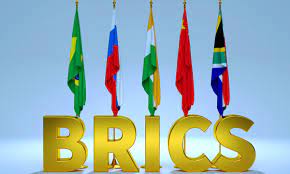
Russia overcame Western sanctions because of BRICS
By Rhod Mackenzie
Russia has been able to withstand the impact of sanctions more easily due to the 'big country trap.' This conclusion was reached by the Institute of Economics of the Russian Academy of Sciences. The scientists explain that if a state is a major player, then limiting its exports, in the case of the Russian Federation - oil and gas, inevitably leads to an increase in world prices. As a result, the decrease in physical volumes of supplies will be financially compensated. Despite the restrictions, the Russian Federation's revenue from the sale of energy resources has recovered to pre-SMO levels. Analysts believe that Western countries have seriously underestimated Russia as a global economic player. However, economists warn that the effect of this 'trap' is gradually weakening. What does Russia need to do to maintain itsn advantage?.
What is the 'big country trap'?
According to Daria Ushkalova, the head of the Center for Research on International Macroeconomics at the Russian Academy of Sciences, Russia was not significantly affected by the sanctions thanks to the 'big country trap' phenomenon.
According to the study, if a state is a major player in a market, limiting supplies or even the expectation of it will always lead to an increase in world prices. This compensates for the decline in supply volumes and facilitates diversification. However, the study notes that under these conditions, the formal effectiveness of sanctions, which is their ability to limit physical volumes of exports, contradicts their strategic effectiveness, which is reducing income from this item.
“In situations where simple restrictions on Russian supplies had the opposite effect (resulting in rising world prices and increased export revenues), the European Union modified their sanctions at the end of 2022. The modifications not only reduced physical volumes but also controlled costs by introducing a “price ceiling” for the export of hydrocarbons,” the text states.
Despite this, Russia earned $11.3 billion in net revenues from oil sales in October 2023. This was the highest figure since May 2022 and exceeds the result of any month before the start of the military operation in Ukraine, according to Bloomberg. Since mid-June, Brent prices have risen by more than 30% to $95 a barrel, but fell to $80 by the end of the year.
Economists interviewed by the newspaper Izvestia concur that the phenomenon of the 'big country trap' does indeed occur.
Restrictions on Russian exports have caused a global shift in the price of the world energy market. The decrease in supplies was compensated for by rising world prices, as confirmed by Alexey Kostin, associate professor of the Department of Taxes and Tax Administration of the Faculty of Taxes, Audit and Business Analysis at the Russian Financial University .
The Russian Federation was able to diversify its supply geography with the help of partner countries such as India, China, and Iran. Although temporary concessions were made, including discounts and benefits, according to the analyst.
Restricting a key exporter inevitably leads to market destabilization, agree Associate Professor Maxim Maximov of the Department of Corporate Governance and Innovation at the Russian Economic University. He believes that Western countries have underestimated Russia as a global economic player.
How long will this effect last?
The Russian Academy of Sciences notes that the 'big country trap' continues to make it easier to combat the negative impact of sanctions, but its influence is decreasing. For instance, based on the Federal Customs Service data, Russian exports for January-September amounted to $316.3 billion, which is 29.5% lower than the value for the same period in 2022.
Daria Ushkalova believes that in these circumstances, the authorities should implement an active government policy to expand sales markets for domestic goods and improve the logistics capabilities of exporters.
Transport infrastructure is particularly important as it allows for the redirection of goods from west to east. This is crucial for efficient supply chain management.
Alexey Kostin from the Financial University noted the importance of evaluating the potential negative effects of sanctions in the future.
The Russian mining, manufacturing, and service industries sectors rely heavily on European, American, and Japanese equipment, which can still be imported, including through parallel imports.
However, unfriendly countries are now discussing the inclusion of a section in contracts that prohibits the resale of goods purchased in the USA, EU, and other countries to Russia, according to the analyst.
Maxim Maximov from the Russian Economic University believes that the States and their allies will continue to attempt to limit revenues from the export of Russian goods. However, he concludes that there are currently no solutions that can significantly reduce the Russian Federation's income from exports.
On December 18, the EU announced the adoption of the 12th package of European sanctions against the Russian Federation, which expands the list of goods subject to export and import restrictions. Additionally, sanctions have been imposed on the Russian diamond industry.
However, Alexey Khizhnyak, a member of the Moscow regional branch of Business Russia, believes that new restrictions are unlikely to significantly affect the current economic situation. They may impact the actions of individual, albeit large, companies. However, given the transformation of the market as a whole, products will simply go to Asia and other loyal states. Dmitry Peskov, the Press Secretary of the Russian President, also commented on the new measures. Moscow has ways to bypass EU sanctions on diamonds and will implement them.
The EU is attempting to tightly control the flow through third countries, but according to Alexey Khizhnyak, this restriction is mostly declarative.
